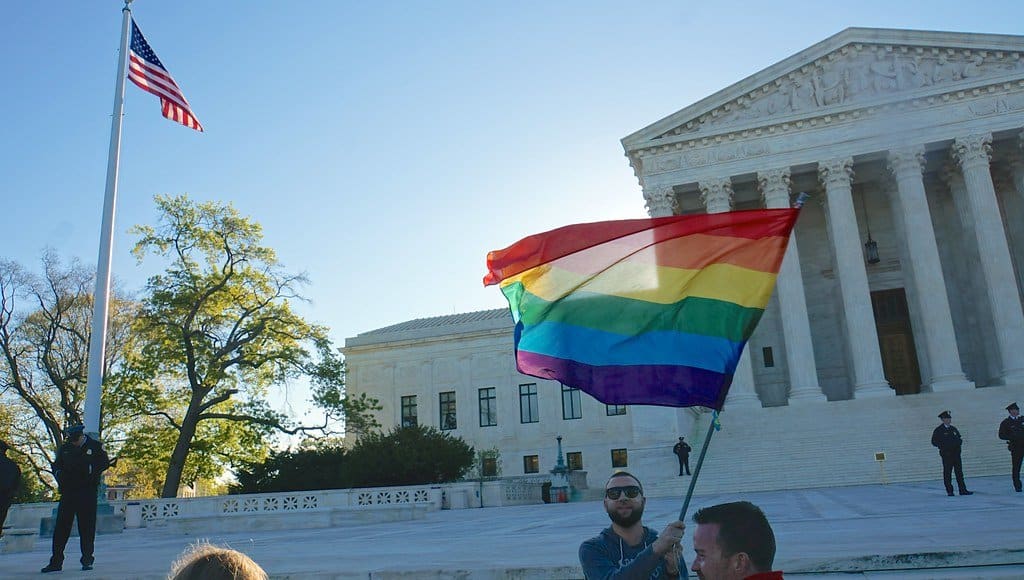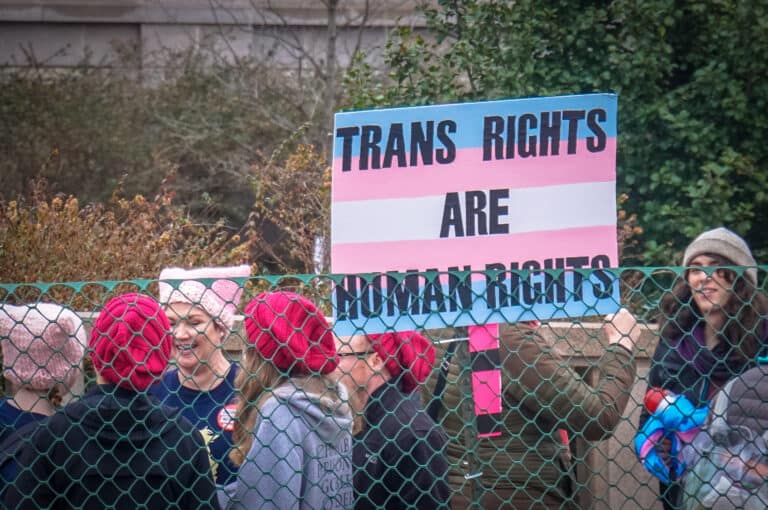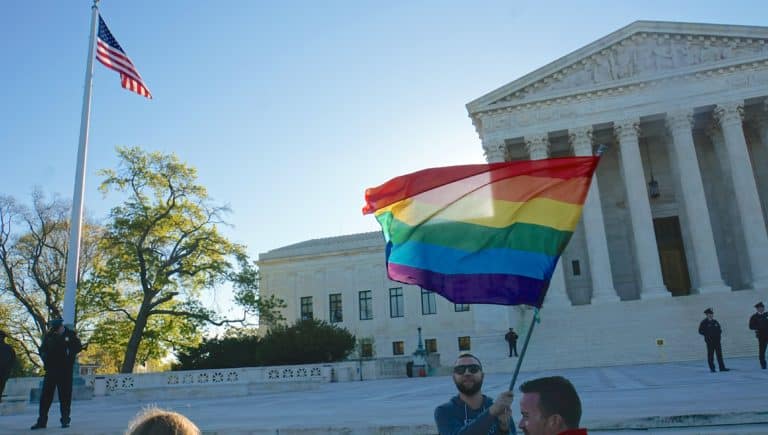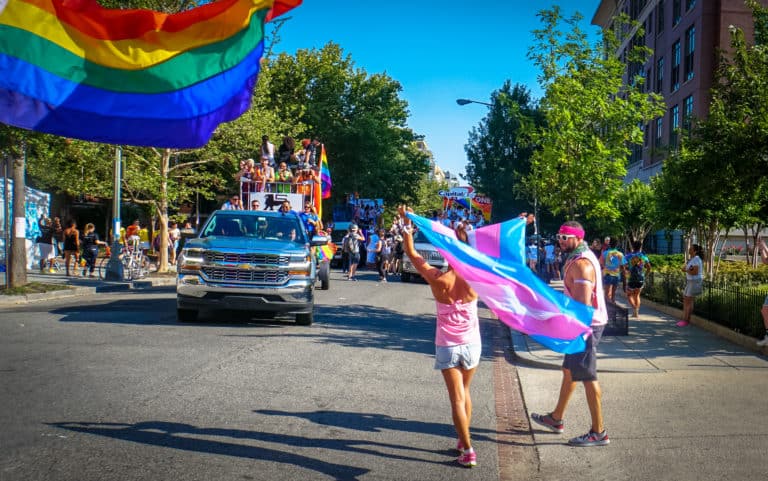Today we continue our review of the amicus briefs submitted in support of the LGBTQ employees in Bostock, Zarda, and Harris.
Gender and Racial Justice Organizations
The National Women’s Law Center and other women’s rights groups argue that any decision holding that sexual orientation and gender identity discrimination are not forms of sex stereotyping prohibited by Title VII will disturb protections for all workers who do not conform to sex stereotypes. Because there is no “principled distinction” between sex discrimination and sexual orientation and gender identity discrimination, employees who face adverse action for engaging in behavior or conduct that defies sex stereotypes will be left guessing whether they have a claim available under Title VII.
A group of anti-sexual assault, domestic violence, and gender-based violence organizations explain that transgender people, already disproportionately likely to be victims of sexual assault and other violent crimes, would face even higher risk without Title VII protections. Joblessness and poverty would push more transgender people into the underground economy, where they are particularly susceptible to violence. The social stigma spawned by the absence of statutory protections could make conditions worse.
The Women’s and Children’s Advocacy Project, Equal Means Equal, and Allies Reaching for Equality urge the Court to hold that Title VII extends to sexual orientation and gender identity discrimination because research demonstrates that state-sanctioned discrimination has severe negative health consequences.
The Lawyers’ Committee for Civil Rights Under Law, the Leadership Conference on Civil and Human Rights, and 57 other civil rights organizations say that excluding sexual orientation and gender identity discrimination from Title VII would disproportionately affect LGBTQ people of color and could also enable pretextual race discrimination against them. The Court’s interpretation would also be at odds with the approach to race discrimination, for which associational discrimination applies and customer preference, a motivating concern in at least two of these cases, is unavailing.
Unions and Workers’ Rights Organizations
The AFL-CIO writes that modern understandings of discrimination can and should affect decision-makers’ thinking, even when the statutory language at issue remains constant. Pointing to its experience with “just cause” discharge and discipline provisions in union contracts, the labor federation describes how labor arbitrators who once viewed discrimination and harassment based on LGBTQ identity as mere “shop talk” that was not cause for discipline have since changed their views.
As evidence for the notion that sexual orientation and gender identity discrimination necessarily implicate sex discrimination, SEIU, the Teamsters, and Jobs with Justice explain that many of their female members in male-dominated professions have experienced sex discrimination in the form of comments about their perceived LGBTQ identity, even if they are straight and/or cisgender.
The National Education Association, American Federation of Teachers, National School Board Association, and AASA, the School Superintendents Association argue that recognition of Title VII’s extension to discrimination because of sexual orientation and gender identity would allow public schools to attract the strongest talent and would also serve to enhance the learning environment and protect students from harassment.
The Impact Fund, National Employment Lawyers Association, Employee Rights Advocacy Institute for Law & Policy, and 19 other workers’ advocacy organizations call attention to lower courts’ confusion over how to separate the concept of sex from sexual orientation and near unanimity over the inseparability of sex and gender identity. In order to avoid “unworkable line-drawing” between sex and sexual orientation and to respect lower courts’ near-total agreement with respect to Title VII’s extension to gender identity discrimination, amici urge the Court to read the statute broadly.
The Southern Poverty Law Center, joined by a number of economic justice groups including Demos and the Economic Policy Institute, explain that LGBTQ people, particularly women and people of color, experience workplace discrimination at high rates. As a result, LGBTQ people can face unemployment, which in turn affects access to housing and health care. Even if they remain employed, discrimination can impair work productivity and mental health.
Corporations and Executives
206 businesses (plus Intel) that together employ over 7 million employees claim that barring discrimination based on sexual orientation and gender identity is good for business and not unreasonably costly. One of the businesses, PricewaterhouseCoopers (formerly Price Waterhouse), was the employer in the landmark sex stereotyping case that bears its name. The businesses contend that diverse and inclusive workforces help them recruit talent, connect with customers, and improve productivity. They further argue that reading Title VII to cover sexual orientation and gender identity discrimination would allow for greater predictability for businesses navigating the law, while a narrow reading would force companies to constantly monitor state and local protections. A group of business organizations and chambers of commerce make a comparable argument.
Altria Group, a tobacco products and alcohol manufacturer and the parent company of Philip Morris, assert that Title VII bars discrimination on the basis of sex stereotyping without excluding LGBTQ people, which benefits both employers and employees. Since Altria typically recruits employees who work for other businesses, it depends on those businesses to not discriminate against LGBTQ workers so that there will be more LGBTQ candidates with the requisite skills.
A group of women CEOs and other C-suite executives write to defend Price Waterhouse’s sex stereotyping theory of sex discrimination. They point to instances of when courts have held employers unlawfully discriminated against women when they relied on sex stereotypes about how women should look and act and explain that such stereotyping still limits opportunities for women in the workplace today. One of the signatories, Tela Gallagher Mathias, is the daughter of Ann Hopkins, the plaintiff in Price Waterhouse who passed away last year.
Medical Organizations
The American Medical Association, American College of Physicians, and 14 other medical, mental health, and health care organizations explain that many of the estimated 1.4 million transgender people living in the United States experience gender dysphoria, a condition in which individuals experience distress caused by a mismatch between their sex assigned at birth and their gender identity. Medical professionals are in full agreement that the best treatment for gender dysphoria is helping patients lead lives aligned with their gender identity. Discrimination against transgender people at work thus frustrates medical treatment by making it more difficult for patients to live openly as their authentic selves.
The American Psychological Association, American Psychiatric Association, American Association for Marriage and Family Therapy, and 3 state psychological associations say that the scientific literature concerning gender and sexuality demonstrates that discrimination because of sexual orientation and gender identity, both of which are typically defined relative to an individual’s sex or sex assigned at birth, is discrimination because of sex.
Legal Organizations
The American Bar Association repeats the but-for, associational, and sex stereotyping theories of sex discrimination in the opening briefs from Bostock and Zarda and the but-for and sex stereotyping theories in the opening brief from Stephens. The brief emphasizes that LGBTQ discrimination has negative economic consequences for individual workers and society in general.
The Legal Aid Society reports that its LGBTQ clients frequently experienced sex discrimination at a young age, before they ever identified as LGBTQ, in the form of homophobic and transphobic bullying that served to reinforce sex stereotypes. The stereotype policing they experienced as children mirrors the anti-LGBTQ discrimination they now face in the workplace.










Daily News & Commentary
Start your day with our roundup of the latest labor developments. See all
February 9
FTC argues DEI is anticompetitive collusion, Supreme Court may decide scope of exception to forced arbitration, NJ pauses ABC test rule.
February 8
The Second Circuit rejects a constitutional challenge to the NLRB, pharmacy and lab technicians join a California healthcare strike, and the EEOC defends a single better-paid worker standard in Equal Pay Act suits.
February 6
The California Supreme Court rules on an arbitration agreement, Trump administration announces new rule on civil service protections, and states modify affirmative action requirements
February 5
Minnesota schools and teachers sue to limit ICE presence near schools; labor leaders call on Newsom to protect workers from AI; UAW and Volkswagen reach a tentative agreement.
February 4
Lawsuit challenges Trump Gold Card; insurance coverage of fertility services; moratorium on layoffs for federal workers extended
February 3
In today’s news and commentary, Bloomberg reports on a drop in unionization, Starbucks challenges an NLRB ruling, and a federal judge blocks DHS termination of protections for Haitian migrants. Volatile economic conditions and a shifting political climate drove new union membership sharply lower in 2025, according to a Bloomberg Law report analyzing trends in labor […]